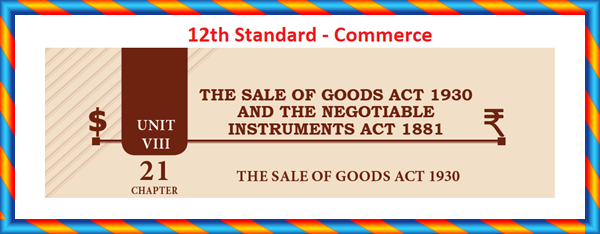Tamil Nadu Board 12th Standard Commerce - Chapter 21: Book Back Answers and Solutions
This post covers the book back answers and solutions for Chapter 21 – Commerce from the Tamil Nadu State Board 12th Standard textbook. These detailed answers have been carefully prepared by our expert teachers at KalviTips.com.
We have explained each answer in a simple, easy-to-understand format, highlighting important points step by step under the relevant subtopics. Students are advised to read and memorize these subtopics thoroughly. Once you understand the main concepts, you’ll be able to connect other related points with real-life examples and confidently present them in your tests and exams.
By going through this material, you’ll gain a strong understanding of Commerce Chapter 21 along with the corresponding book back questions and answers (PDF format).
Question Types Covered:
- 1 Mark Questions: Choose the correct answer, Fill in the blanks, Identify the correct statement, Match the following
- 2 Mark Questions: Answer briefly
- 3, 4, and 5 Mark Questions: Answer in detail
All answers are presented in a clear and student-friendly manner, focusing on key points to help you score full marks.
All the best, Class 12 students! Prepare well and aim for top scores. Thank you!
Chapter 21: The Sale Of Goods Act 1930
I. Choose the correct answer.
1. Sale of Goods Act was passed in the yeara) 1940
b) 1997
c) 1930
d) 1960
Answer Key:
c) 1930
2. Which of the below constitutes the essential element of contract of sale?
a) Two parties
b) Transfer of property
c) Price
d) All of the above
Answer Key:
d) All of the above
3. Which of the below is not a good?
a) Stocks
b) Dividend due
c) Crops
d) Water
Answer Key:
b) Dividend due
4. In case of the sale, the _________ has the right to sell.
a) Buyer
b) Seller
c) Hirer
d) Consignee
Answer Key:
b) Seller
5. The property in the goods means the
a) Possession of goods
b) Custody of goods
c) Ownership of goods
d) Both (a) and (b)
Answer Key:
c) Ownership of goods
II. Very short answer questions.
1. What is a contract of sale of goods?Answer Key:
- Contract of sale of goods is a contract whereby the seller transfers or agrees to transfer the property (ownership) of the goods to the buyer for a price.
- The term ‘ownership’ is utmost importance in the sale of goods.
2. List down the essential elements of a contract of sale.
Answer Key:
- Two Parties
- Transfer of Property
- Goods
- Price
- Includes both ‘Sale’ and ‘Agreement to Sell’.
3. What is meant by goods?
Answer Key:
- The subject matter of contract of sale must be goods.
- It excludes money, actionable claims and immovable property.
- The term ‘goods’ includes every kind of movable property, stocks and shares, growing crops etc.
4. What is a Contingent Goods?
Answer Key:
- Contingent goods are the goods, the acquisition of which by the seller depends upon a contingency.
- Contingent goods are a part of future goods.
III. Short answer questions.
1. Discuss in detail about existing goods.Answer Key:
- Existing Goods existing goods are those owned or possessed by the seller at the time of contract of sale.
- Goods possessed even refer to sale by agents or by pledgers.
- The diagram given below exhibits the type of goods covered under the sale of goods act.
- Specific Goods
- Ascertained Goods
- Generic Goods
2. Discuss the implied conditions and warranties in sale of goods contract.
Answer Key:
Implied Conditions:
- Conditions as to Title
- Conditions as to Description
- Sale by Sample
- Conditions as to Quality or Fitness
- Quiet Possession
- Free from Any Encumbrances
- Warranty in the case of Dangerous Goods
IV. Long answer questions.
1. Explain in detail the elements of Contract of sale.Answer Key:
Two Parties:
- A contract of sale involves two parties – the seller and the buyer.
- The buyer and the seller should be two different persons.
- To constitute sale, the seller must transfer or agree to transfer the ownership in the good to the buyer.
- A mere transfer of possession does not amount to sale.
- The subject matter of contract of sale must be goods.
- It excludes money, actionable claims and immovable property.
- The monetary consideration for the goods sold is called price.
- If goods are exchanged for goods, it is only barter and not a sale.
- The term contract of sale includes both sale and agreement to sell.
- If the property in goods is transferred immediately to the buyer it is called a sale.
2. Distinguish between Conditions and Warranty.
Answer Key:
|
Basis of Difference
|
Condition
|
Warranty
|
|
Meaning
|
It is a stipulation which is essential
to the main purpose of the contract of sale.
|
It is a stipulation which is collateral
to the main purpose of contract.
|
|
|
Condition is so essential to the
contract that the breaking of which cancels out the contract.
|
It is of subsidiary or inferior
character. The violation of warranty will not revoke the contract.
|
|
Transfer of Ownership
|
Ownership on goods cannot be
transferred without fulfilling the conditions.
|
Ownership on goods can be transferred
on the buyer without fulfilling the warranty.
|
|
Remedy
|
In case breach of contract, the
affected party can cancel the contract and claim damages.
|
In the case of breach of warranty, the
affected party cannot cancel the contract but can claim damages only.
|
|
Treatment
|
Breach of condition may be treated as
breach of warranty.
|
Breach of warranty cannot be treated as
breach of condition.
|










0 Comments:
Post a Comment